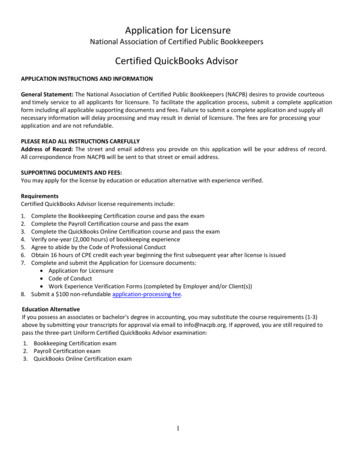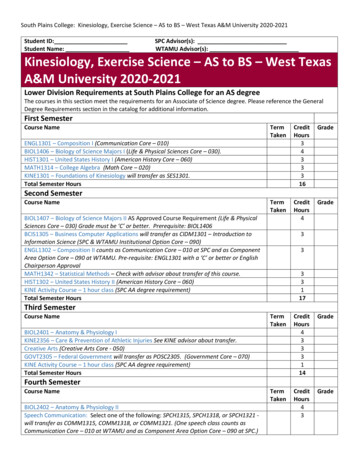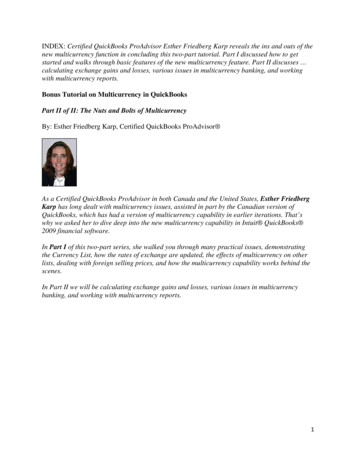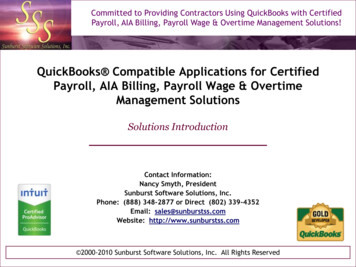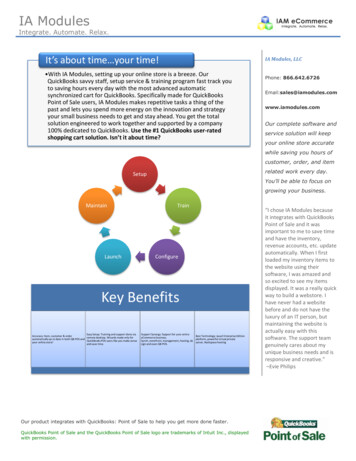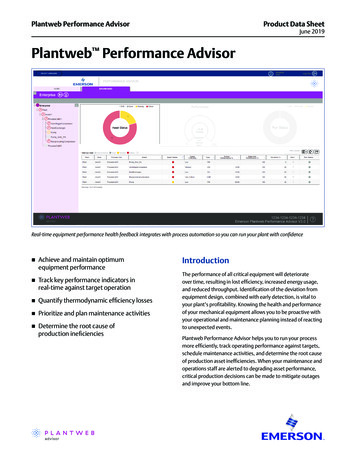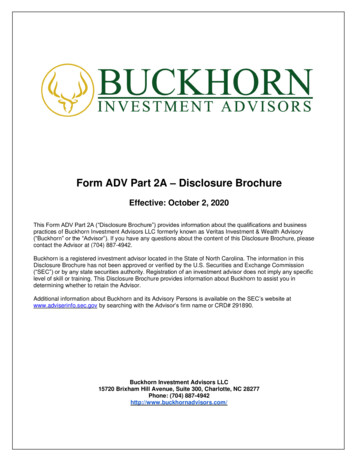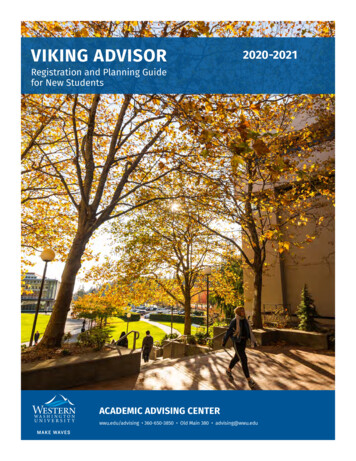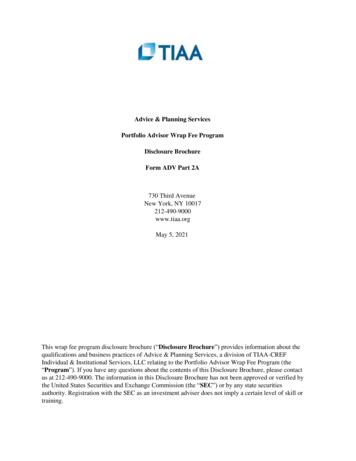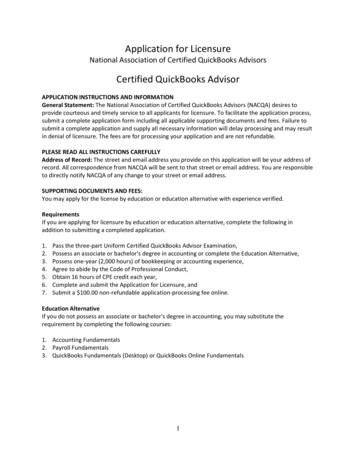
Transcription
Application for LicensureNational Association of Certified QuickBooks AdvisorsCertified QuickBooks AdvisorAPPLICATION INSTRUCTIONS AND INFORMATIONGeneral Statement: The National Association of Certified QuickBooks Advisors (NACQA) desires toprovide courteous and timely service to all applicants for licensure. To facilitate the application process,submit a complete application form including all applicable supporting documents and fees. Failure tosubmit a complete application and supply all necessary information will delay processing and may resultin denial of licensure. The fees are for processing your application and are not refundable.PLEASE READ ALL INSTRUCTIONS CAREFULLYAddress of Record: The street and email address you provide on this application will be your address ofrecord. All correspondence from NACQA will be sent to that street or email address. You are responsibleto directly notify NACQA of any change to your street or email address.SUPPORTING DOCUMENTS AND FEES:You may apply for the license by education or education alternative with experience verified.RequirementsIf you are applying for licensure by education or education alternative, complete the following inaddition to submitting a completed application.1.2.3.4.5.6.7.Pass the three-part Uniform Certified QuickBooks Advisor Examination,Possess an associate or bachelor's degree in accounting or complete the Education Alternative,Possess one-year (2,000 hours) of bookkeeping or accounting experience,Agree to abide by the Code of Professional Conduct,Obtain 16 hours of CPE credit each year,Complete and submit the Application for Licensure, andSubmit a 100.00 non-refundable application-processing fee online.Education AlternativeIf you do not possess an associate or bachelor's degree in accounting, you may substitute therequirement by completing the following courses:1. Accounting Fundamentals2. Payroll Fundamentals3. QuickBooks Fundamentals (Desktop) or QuickBooks Online Fundamentals1
CERTIFIED QUICKBOOKS ADVISOR APPLICATION FOR LICENSURENATIONAL ASSOCIATION OF CERTIFIED QUICKBOOKS ADVISORSADDITIONAL IMPORTANT INFORMATION:1. QuickBooks Experience: In accordance with the NACQA CQA Licensing Regulations and Rules,“QuickBooks experience” means applying QuickBooks software skills in a bookkeeping or accountingenvironment.2. License Renewal: All CQA licenses expire December 31 of each year. Licensees have until December31 to renew their license. The length of a licensee’s first renewal cycle depends on how far into thecurrent renewal cycle initial licensure was obtained. Each renewal cycle thereafter is for a full year.Additionally, the fee paid with this application for licensure is an application-processing fee only. Itdoes not include a renewal fee. Each licensee is responsible to renew licensure PRIOR to theexpiration date shown on the current license.3. Continuing Professional Education: CQA’s are required to complete 16 hours of approved CPE ineach year period. In approximately November of each year, CPE Reporting and CQA License Renewalforms will be mailed to the licensee for the purpose of reporting completion of qualified CPE coursesas a condition of renewal of licensure. The licensee must complete and return the CPE Reportingform with the CQA License Renewal form to NACQA no later than December 31. The licensee isresponsible to obtain the forms and to report their CPE by the December 31 deadline. Failure tocomplete or report CPE will result in denial of renewal of the CQA license. If the initial license term isless than the full year CPE reporting period, the CQA is required to complete 4 hours of CPE for eachfull quarter of licensure during the CPE reporting period.4. Updating Address Information: It is your responsibility to maintain a current street and emailaddress with NACQA. If your street or email address is incorrect, you will not receive renewalnotices or other correspondence. Street and email address changes can be made online in theMembers Only section of the NACQA website at www.CertifiedQuickBooksAdvisors.org.5. Name Change: If you have been licensed by NACQA under any other name, please submitdocumentation of your name change (i.e. copy of a marriage license or divorce decree).6. Mail Complete Application to:NACQAAttention: Licensing283 N. 300 W. Suite 504Kaysville, UT 840372
CERTIFIED QUICKBOOKS ADVISOR APPLICATION FOR LICENSURENATIONAL ASSOCIATION OF CERTIFIED QUICKBOOKS ADVISORSPlease complete and mail the completed Employment/Client Experience Verification form documentingyour completion of the NACQA Certified QuickBooks Advisor license experience requirement. Please donot fax or email (.pdf) the completed form.APPLICANT GENERAL INFORMATIONFirst NameMILast Name(Complete how you want your name to appear on your license)AddressCityStateZipPhoneFaxEmailDateFor Internal Use OnlyExamsPaymentCode of ConductCourse Completion (Quizzes)ExperienceEducationLicense #3
CERTIFIED QUICKBOOKS ADVISOR APPLICATION FOR LICENSURENATIONAL ASSOCIATION OF CERTIFIED QUICKBOOKS ADVISORSPART l: TO BE COMPLETED BY CQA CANDIDATE:CERTIFIED QUICKBOOKS ADVISOR (CQA) LICENSE REQUIREMENTCandidates for CQA licensure must have obtained one-year of bookkeeping or accounting experience withQuickBooks. Candidates must complete and verify one-year (2,000 hours) of on-the-job bookkeeping oraccounting experience. Candidates must submit an Employment/Client Verification form signed by anowner or manager of the business of employment or by a client(s) of the QuickBooks advisor.INSTRUCTIONSSubmit a separate form (Part ll) for each employer/client you have listed below. Request that eachemployer/client listed complete the form and return it to you for submission.QUICKBOOKS EXPERIENCE:Please provide the following information beginning with the most recent experience. (Use additionalsheets if necessary.)EMPLOYER/CLIENTName:Address:City: State: Zip:Number of Hours:EMPLOYER/CLIENTName:Address:City: State: Zip:Number of Hours:EMPLOYER/CLIENTName:Address:City: State: Zip:Number of Hours:4
CERTIFIED QUICKBOOKS ADVISOR APPLICATION FOR LICENSURENATIONAL ASSOCIATION OF CERTIFIED QUICKBOOKS ADVISORSPART l: TO BE COMPLETED BY CQA CANDIDATE: (CONTINUED)EMPLOYER/CLIENTName:Address:City: State: Zip:Number of Hours:EMPLOYER/CLIENTName:Address:City: State: Zip:Number of Hours:EMPLOYER/CLIENTName:Address:City: State: Zip:Number of Hours:EMPLOYER/CLIENTName:Address:City: State: Zip:Number of Hours:Total Number of Hours (must meet or exceed 2,000 hours):5
CERTIFIED QUICKBOOKS ADVISOR APPLICATION FOR LICENSURENATIONAL ASSOCIATION OF CERTIFIED QUICKBOOKS ADVISORSPART II: TO BE COMPLETED BY CQA CANDIDATE’S EMPLOYER/CLIENT:Name of CQA License candidate:Please answer “Yes” or “No.”I understand that “QuickBooks experience” means applying bookkeeping or accounting skills withQuickBooks as an employee or independent contractor for and in behalf of a business or nonprofitorganization. Yes NoI hereby attest that the applicant named above was employed or contracted during the following periodsof time during which the candidate satisfactorily applied bookkeeping or accounting skills withQuickBooks. Yes NoVERIFICATION:Company Name:Address:City: State: Zip:Telephone:Dates of employment/services: From toPosition:Number of Hours:Employer/client Print Name: Employer/client Signature:Comments:6
CERTIFIED QUICKBOOKS ADVISOR APPLICATION FOR LICENSURENATIONAL ASSOCIATION OF CERTIFIED QUICKBOOKS ADVISORSEDUCATION VERIFICATIONIf applying by education with a Bachelor’s or Associates Degree in Accounting please include your officialtranscripts with the license application.School Attended:Degree Awarded:Date of Graduation:7
CODE OF PROFESSIONAL CONDUCT OF THENATIONAL ASSOCIATION OF CERTIFIED QUICKBOOKS ADVISORSAGREEMENTPlease read, sign, and mail the completed Code of Professional Conduct of the National Association ofCertified QuickBooks Advisors. Please do not fax or email (.pdf) the signed Agreement.IntroductionThe Code of Professional Conduct of the National Association of Certified QuickBooks Advisors (NACQA)include principles that govern the performance of professional services by licensees.The Code of Professional Conduct was adopted by the NACQA Licensing Board to provide guidance to alllicensees—those in public practice, in industry, in government, and in education—in the performance oftheir professional responsibilities.Compliance with the Code of Professional Conduct, as with all standards in an open society, dependsprimarily on licensees' understanding and voluntary actions, secondarily on reinforcement by peers andpublic opinion, and ultimately on disciplinary proceedings, when necessary, against licensees who fail tocomply.Section 100 – Principles of Professional Conduct.01 Obtaining a NACQA license is voluntary. By obtaining a license, a licensee assumes an obligation ofself-discipline above and beyond the requirements of laws and regulations.02 These Principles of the Code of Professional Conduct express the profession's recognition of itsresponsibilities to the public and to clients. They guide licensees in the performance of their professionalresponsibilities and express the basic tenets of ethical and professional conduct. The Principles call for anunswerving commitment to honorable behavior, even at the sacrifice of personal advantage.Section 101 - Article I—ResponsibilitiesIn carrying out their responsibilities as professionals, licensees should exercise sensitive professional andmoral judgments in all their activities.01 As professionals, licensees perform an essential role in society. Consistent with that role, licensees ofthe NACQA have responsibilities to all those who use their professional services. Licensees also have acontinuing responsibility to cooperate with each other to improve the skill of bookkeeping, maintain thepublic's confidence, and carry out the profession's special responsibilities for self-governance. Thecollective efforts of all licensees are required to maintain and enhance the traditions of the profession.Section 102 - Article II—The Public InterestLicensees should accept the obligation to act in a way that will serve the public interest, honor the publictrust, and demonstrate commitment to professionalism.01 A distinguishing mark of a profession is acceptance of its responsibility to the public. The bookkeepingprofession's public consists of clients, credit grantors, governments, employers, investors, the businessand financial community, and others who rely on the objectivity and integrity of licensees to maintain theorderly functioning of commerce. This reliance imposes a public interest responsibility on licensees. The1
CODE OF PROFESSIONAL CONDUCTNATIONAL ASSOCIATION OF CERTIFIED QUICKBOOKS ADVISORSpublic interest is defined as the collective well-being of the community of people and institutions theprofession serves.02 In discharging their professional responsibilities, licensees may encounter conflicting pressures fromamong each of those groups. In resolving those conflicts, licensees should act with integrity, guided by theprecept that when licensees fulfill their responsibility to the public, clients' and employers' interests arebest served.03 Those who rely on licensees expect them to discharge their responsibilities with integrity, objectivity,due professional care, and a genuine interest in serving the public. They are expected to provide qualityservices, enter into fee arrangements, and offer a range of services—all in a manner that demonstrates alevel of professionalism consistent with these Principles of the Code of Professional Conduct.04 All who accept licensure in the NACQA commit themselves to honor the public trust. In return for thefaith that the public reposes in them, licensees should seek continually to demonstrate their dedicationto professional excellence.Section 103 - Article III—IntegrityTo maintain and broaden public confidence, licensees should perform all professional responsibilities withthe highest sense of integrity.01 Integrity is an element of character fundamental to professional recognition. It is the quality fromwhich the public trust derives and the benchmark against which a licensee must ultimately test alldecisions.02 Integrity requires a licensee to be, among other things, honest and candid within the constraints ofclient confidentiality. Service and the public trust should not be subordinated to personal gain andadvantage. Integrity can accommodate the inadvertent error and the honest difference of opinion; itcannot accommodate deceit or subordination of principle.03 Integrity is measured in terms of what is right and just. In the absence of specific rules, standards, orguidance, or in the face of conflicting opinions, a licensee should test decisions and deeds by asking: "AmI doing what a person of integrity would do? Have I retained my integrity?" Integrity requires a licenseeto observe both the form and the spirit of technical and ethical standards; circumvention of thosestandards constitutes subordination of judgment.04 Integrity also requires a licensee to observe the principles of objectivity and of due care.Section 104 - Article IV—ObjectivityA licensee should maintain objectivity and be free of conflicts of interest in discharging professionalresponsibilities.01 Objectivity is a state of mind, a quality that lends value to a licensee's services. It is a distinguishingfeature of the profession. The principle of objectivity imposes the obligation to be impartial, intellectuallyhonest, and free of conflicts of interest.2
CODE OF PROFESSIONAL CONDUCTNATIONAL ASSOCIATION OF CERTIFIED QUICKBOOKS ADVISORS.02 Licensees often serve multiple interests in many different capacities and must demonstrate theirobjectivity in varying circumstances. Licensees in public practice render bookkeeping, accounting, payroll,tax, and business advisory services. Other licensees perform bookkeeping, accounting, and preparefinancial statements in the employment of others, and serve in financial and management capacities inindustry, education, and government. They also educate and train those who aspire to admission into theprofession. Regardless of service or capacity, licensees should protect the integrity of their work, maintainobjectivity, and avoid any subordination of their judgment.03 For a licensee in public practice, the maintenance of objectivity requires a continuing assessment ofclient relationships and public responsibility. In providing all other services, a licensee should maintainobjectivity and avoid conflicts of interest.04 Licensees not in public practice have the responsibility to maintain objectivity in rendering professionalservices. Licensees employed by others to perform bookkeeping, accounting, and prepare financialstatements are charged with the same responsibility for objectivity as licensees in public practice andmust be scrupulous in their application of bookkeeping and accounting principles and candid in all theirdealings with licensees in public practice.Section 105 - Article V—Due CareA licensee should observe the profession's ethical standards, strive continually to improve competence andthe quality of services, and discharge professional responsibility to the best of the licensee's ability.01 The quest for excellence is the essence of due care. Due care requires a licensee to dischargeprofessional responsibilities with competence and diligence. It imposes the obligation to performprofessional services to the best of a licensee's ability with concern for the best interest of those for whomthe services are performed and consistent with the profession's responsibility to the public.02 Competence is derived from a synthesis of education and experience. It begins with a mastery of thecommon body of knowledge required for designation as a licensee. The maintenance of competencerequires a commitment to learning and professional improvement that must continue throughout alicensee's professional life. It is a licensee's individual responsibility. In all engagements and in allresponsibilities, each licensee should undertake to achieve a level of competence that will assure that thequality of the licensee's services meets the high level of professionalism required by these Principles.03 Competence represents the attainment and maintenance of a level of understanding and knowledgethat enables a licensee to render services with facility and acumen. It also establishes the limitations of alicensee's capabilities by dictating that consultation or referral may be required when a professionalengagement exceeds the personal competence of a licensee or a licensee's firm. Each licensee isresponsible for assessing his or her own competence—of evaluating whether education, experience, andjudgment are adequate for the responsibility to be assumed.04 Licensees should be diligent in discharging responsibilities to clients, employers, and the public.Diligence imposes the responsibility to render services promptly and carefully, to be thorough, and toobserve applicable technical and ethical standards.05 Due care requires a licensee to plan and supervise adequately any professional activity for which heor she is responsible.3
CODE OF PROFESSIONAL CONDUCTNATIONAL ASSOCIATION OF CERTIFIED QUICKBOOKS ADVISORSSection 106 - Article VI—Scope and Nature of ServicesA licensee in public practice should observe the Principles of the Code of Professional Conduct indetermining the scope and nature of services to be provided.01 The public interest aspect of licensees' services requires that such services be consistent withacceptable professional behavior for licensees. Integrity requires that service and the public trust not besubordinated to personal gain and advantage. Objectivity requires that licensees be free from conflicts ofinterest in discharging professional responsibilities. Due care requires that services be provided withcompetence and diligence.02 Each of these Principles should be considered by licensees in determining whether or not to providespecific services in individual circumstances. No hard-and-fast rules can be developed to help licenseesreach these judgments, but they must be satisfied that they are meeting the spirit of the Principles in thisregard.03 In order to accomplish this, licensees should: Practice in firms that ensure that services are competently delivered and adequately supervised.Assess, in their individual judgments, whether an activity is consistent with their role asprofessionals.4
CODE OF PROFESSIONAL CONDUCTNATIONAL ASSOCIATION OF CERTIFIED QUICKBOOKS ADVISORSLicensee AgreementI agree to comply with the Code of Professional Conduct of the National Association of CertifiedQuickBooks Advisors.NACQA Licensee SignatureDateLicensee Printed Name5
NATIONAL ASSOCIATION OF CERTIFIED QUICKBOOKS ADVISORS 2 ADDITIONAL IMPORTANT INFORMATION: 1. QuickBooks Experience: In accordance with the NACQA CQA Licensing Regulations and Rules, “QuickBooks experience” means applying QuickBooks software
